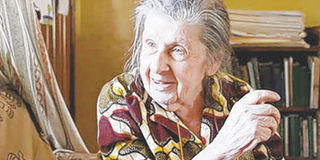PROFILE : The street life of author Marjorie Oludhe

Writer knew the back streets of Nairobi well, mingling well with the homeless and the mitumba sellers around her humble flat in Ngara. PHOTO | FILE
What you need to know:
Securing that most coveted appointment with mama Marjorie was the easiest thing for me because for some time already she had been a friend, a literary mentor and, yes, a mother to me.
When I was called upon by the Sunday Nation to write a review to the collection of short stories entitled Street Life, I chose to meet the author, Mrs Marjorie Oludhe Macgoye in person to get a sense of where she came from while penning one of the most vivid and empathetic renditions of life in the cold and rugged pavements of a Nairobi street.
Securing that most coveted appointment with mama Marjorie was the easiest thing for me because for some time already she had been a friend, a literary mentor and, yes, a mother to me.
I had already drunk endless cups of tea and munched countless cookies at her flat in Ngara, Nairobi.
Moreover, her son, Francis Oludhe, was a close friend and classmate of mine.
But sitting with Marjorie in those heady days of the early 1990s revealed to me that Marjorie was a girl of the street. She knew the back side of Nairobi in a manner, perhaps, comparable only to Major Mwangi’s clinical promenade in Going Down River Road.
In those short portraits in Street Life, she embedded herself almost to a fault in the life of the Nairobi street urchins, the lot that Evans Kidero would nicely shelve away to allow for a clean, smooth visit of town by President Barack Obama.
Marjorie could achieve this because she literally lived in the street. For a nomad by taste and upbringing like myself, I could never fathom living in one flat for decades.
Marjorie lived in Ngara, surrounded by the daily goings and comings, the clutter and clang of jua kali artisans, mkokoteni pushers and the mitumba call-outs of Ngara. She shunned materialism as was evidenced by her simple furnishings.
She jumped into a matatu to visit our editorial offices in Westlands and often turned down my offers to drop her home.
And yet she went about it all quietly, without drama or ostentation. In those days when writers were not just to be read but to be heard also making strong political statements, Marjorie remained quietly steely, poetic and motherly.
Shameful divide
Street Life, and Coming to Birth, remain perhaps the most evocative testaments to her feminine, motherly perspective. In the latter novel, as woman and mother, she was able to draw a fitting parallel between Paulina’s necessary labour pains to the painful
experience of Kenya as a country as it came to birth upon its independence from British rule.
But for Marjorie, that our independence gave birth to street children and a shameful divide between the haves and the have- nots was the ultimate mockery of the struggle for independence. Perhaps what gave her the strength to live through it all was a combination of her wry sense of humour and devotion to her faith as an Anglican.
Make no mistake, Marjorie was fun to be with. As serious as literature was, for her it was also to be enjoyed. I will always remember that Marjorie introduced me to the poetry reading sessions at the Goethe Institute.
She also took me for the first time to Paa Ya Paa in Kiambu, which was then yet another hotbed of cultural activity. Most of all, she was a fun story teller. I loved those anecdotes about her literary spurring with the likes of Okot P’ Bitek; and more how she composed ‘Song of Nyar Loka’ as her reply to ‘Song of Lawino.’
Of course, as often happens, a time came when our paths did not cross as much as they did earlier.
On my part I did something akin to what Christopher Okigbo did when he hung his poetic pen to go to the frontlines of the Biafran War.
I, too, hung my literary weaponry to take my place in the frontlines of the war against poverty. After all when I was done with the unrivalled eloquence of Mwalimu Austin Bukenya, I had to go forth to the world to do “all that appertained to that degree”.
Considered the grand matriarch of Kenyan literature, Ms Macgoye, who died aged 87, was one of the few surviving women writers of the pioneering generation that included Grace Ogot and Asenath Odaga.
Simply referred by the acronym MOM by many Kenyans who studied her book Coming to Birth, and read her poem ‘A Freedom Song’, Ms Macgoye was found dead at her Ngara home in Nairobi on the morning of December 1st, according to family sources.
In her last interview with the Nation she spoke of her long journey, the mistakes and the faith.
“If you are really trusting in the Lord you will keep going.
“Although I made many mistakes and wrong judgments in the course of this journey, I trusted in the Lord,”
Fare thee well, Marjorie, in the immortal world of the distinguished dead.
Andrew Leteipa ole Sunkuli is a publisher and entrepreneur based in Nairobi
Email: [email protected]




